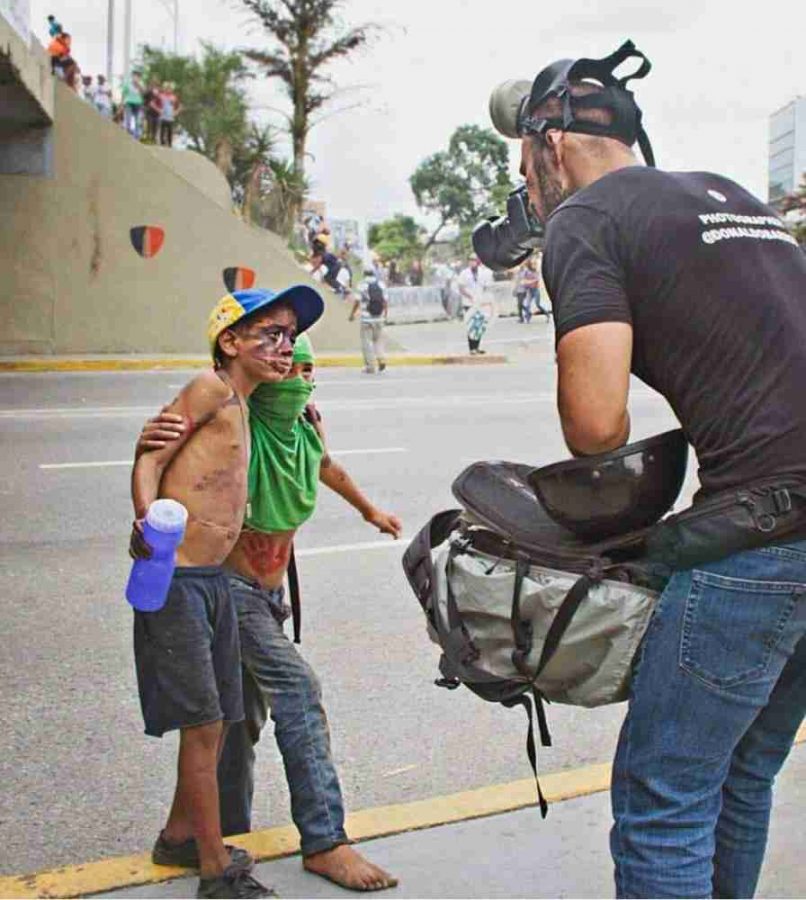The children of Venezuela’s “Revolution”
June 1, 2017
“I declare that I will not allow a single street child in Venezuela; otherwise, I will stop calling myself Hugo Chavez Frías”. These were Venezuela’s former president’s words on the day he took office in the Latin American country back in 1999.
Children in Caracas, Venezuela joining manifestation against government
Eighteen years later, images like the one above are traveling around the world. Venezuela’s shocking economic situation has become a concern for some powers around the globe. The big question is why. A country with no more than 30 million habitants does not sound powerful. However, this small land holds the biggest oil reserve in the world, rising above countries like Dubai and Iran.
This fact triggers many questions about Venezuela and its government’s administration. For example, how is it possible that in a country with a huge oil reserve there is an 800% of inflation, 8% unemployment rate, and 85% of medicines are unavailable? The answer to these questions would require more than just one newspaper article, starting from a bad administration of resources to the failure of a socialistic system. One big concern about Venezuela for countries like The United States would be the impact of this crisis on its oil price, for example. However, for Venezuelans the big concern is survival.
For the past two months, Venezuelans have been protesting on the streets asking for a solution to the problems recently mentioned and the respect of their constitution and human rights. College students have been leading the manifestations, parents and grandparents have been seen on the streets facing a brutal repression by the army and police forces. Nevertheless, there is a new addition to the picture: children.
These children live in the poor areas of Caracas, the capital city. Many of them are joining their parents in the protests because they are tired of the struggle that represent finding food, skipping meals, and having to work after school to help their parents afford their daily bread, which is scarier every day.
Other children belong to the streets; they are part of that group that Chavez promised would take out of the streets by the end of his presidency. They are hungry, digging in trash bags, living in hostile environments, and have lost their parents due to crimes, hunger and diseases they could not afford to treat. They are children, and they are fighting like men.
These kids have joined the crowd, and decided at a very young age (8 to 12 years old) to inhale tear gas and get shot during the manifestations. They have decided to fight back even knowing they will not have a proper medical treatment if they get injured. They do it because they are hungry, tired, alone, in danger and they want a better future.
All in all, Chavez’s promise was not fulfilled, in fact it seems like it had the opposite effect: the number of street children increased during his time in office, and it keeps rising during his “legacy”, as Chavez named the current president Nicolás Maduro.
These children who were born in Chavez “Revolución” (Revolution) as he called his government system, are now the face of Venezuela, a country that seems to be desperate, starving, concerned, and dying, but at the same time they are the face of a brave, courageous, hopeful and full of future country which seems to be waking up after a very bad nightmare.





Moises • Jun 19, 2017 at 12:35 pm
Great, but I just want to point out that flat out why do you not just name he system for what it is?. Socialism. Left wing ideals. Otherwise good but needed more info.